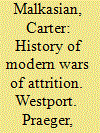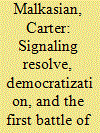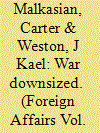| Srl | Item |
| 1 |
ID:
080727


|
|
|
|
|
| Publication |
2008.
|
| Summary/Abstract |
A common argument is that the United States deployed inadequate forces
to secure Iraq. This paper attempts to back that argument with empiricalevidence. Evidence collected in Al Anbar province strongly suggests that a
larger number of forces would have reduced insurgent activity in 2004 and
2005. During this period, suppressing large-scale insurgent activity required
directly protecting the population through traditional counterinsurgency
techniques, such as patrolling, manning outposts, and running checkpoints.
Unfortunately, scarcity of US forces meant that such labor-intensive operations
could not be sustained in key areas. Some have argued that the United
States should have focused on building indigenous forces as a means of
providing the necessary numbers. Yet indigenous forces offered no
alternative. Even with embedded advisors and air support, indigenous forces
could not survive against a vibrant insurgency sustained by local support.
Nothing substituted for large numbers of US ground forces. This conclusion
places scarcity of US forces as a major cause of the fiasco in Iraq.
|
|
|
|
|
|
|
|
|
|
|
|
|
|
|
|
| 2 |
ID:
157579


|
|
|
| 3 |
ID:
046127


|
|
|
|
|
| Publication |
Westport, Praeger, 2002.
|
| Description |
ix, 240p.
|
| Series |
Studies in military history and international affars
|
| Standard Number |
0275973794
|
|
|
|
|
|
|
|
|
|
|
|
Copies: C:1/I:0,R:0,Q:0
Circulation
| Accession# | Call# | Current Location | Status | Policy | Location |
| 046636 | 355.02/MAL 046636 | Main | On Shelf | General | |
|
|
|
|
| 4 |
ID:
176442


|
|
|
| 5 |
ID:
188338


|
|
|
|
|
| Summary/Abstract |
At the end of 2021, the US Army published Modern War in an Ancient Land: The United States Army in Afghanistan, 2001–2014. It is a major two-volume history of the US Army in the war in Afghanistan. The primary authors are E.J. Degen, Director of the Army's Operation Enduring Freedom (OEF) Study Group, and Mark Reardon, a senior civilian historian at US Army Center of Military History. The work has 836 total pages of text and covers most intense period of US combat operations of the war. It is the closest thing that we have yet to an official history of the war and is likely to remain the closest thing for some time. The work contains valuable insights into counterinsurgency in Afghanistan. The authors see the concept as an effective tactical approach if properly aligned with strategy.
|
|
|
|
|
|
|
|
|
|
|
|
|
|
|
|
| 6 |
ID:
071973


|
|
|
|
|
| Publication |
2006.
|
| Summary/Abstract |
The political side of counterinsurgency has long been recognized as more important than the military side. The major works on counterinsurgency call for political reform that redresses legitimate insurgent grievances. Thereby, insurgents are encouraged to pursue their aims via political instead of military means. In western Iraq, insurgent perceptions of US weakness inhibited effective political reform. Moderate Sunnis did not engage the Coalition or Iraqi government until these perceptions had been revised. The connection between insurgent perceptions and effective political reform deserves greater attention. With the exception of some arguments from the political science field, the literature on counterinsurgency insufficiently addresses the importance of insurgent perceptions.
|
|
|
|
|
|
|
|
|
|
|
|
|
|
|
|
| 7 |
ID:
074803


|
|
|
|
|
| Publication |
2006.
|
| Summary/Abstract |
Perceptions and efforts to signal resolve can play an important role in counterinsurgency. The Coalition offensive against Fallujah in April 2004 demonstrates the limitations of relying on military force to signal resolve. The offensive catalyzed insurgent violence in Iraq and generated popular support for the insurgency. The Coalition prematurely halted the offensive because the Iraqi Governing Council (IGC) could not maintain support for the Coalition in the face of popular outrage. Given the importance of democratizing Iraq and establishing a sovereign government, the objections of the IGC could not be ignored. Without Iraqi political support, military force ultimately signaled weakness instead of resolve.
|
|
|
|
|
|
|
|
|
|
|
|
|
|
|
|
| 8 |
ID:
110928


|
|
|
|
|
| Publication |
2012.
|
| Summary/Abstract |
The United States, facing deepening economic and fiscal woes at home, is preparing to withdraw from Afghanistan. More and more policymakers, congressional representatives, and members of the public are calling for the majority of U.S. forces to pull out as quickly as possible and for Washington to shift from an expensive counterinsurgency strategy, in which tens of thousands of U.S. and NATO troops protect the Afghan population, to a cheaper counterterrorism strategy, in which special operations forces strike at terrorist leaders in Afghanistan and Pakistan and the Afghans are left largely on their own.
|
|
|
|
|
|
|
|
|
|
|
|
|
|
|
|